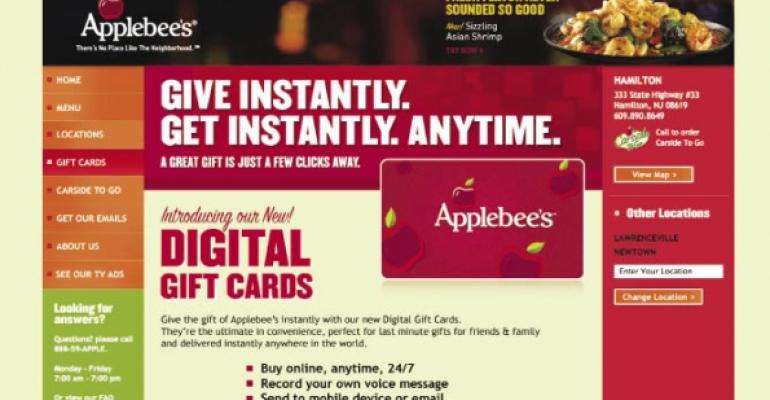Applebee’s Neighborhood Grill & Bar has become the latest casual-dining operator to join the increasingly popular virtual gift card game.
At the same time, the Overland Park, Kan.-based chain upped the ante by making the service available from its Facebook fan page and its website.
Bridget Moen, senior brand manager for gift cards at Applebee’s Services Inc., said the “exciting and innovative” nature of virtual gift cards and her chain’s Facebook interface aided in the rollout.
Commenting on the technology, which is becoming more popular in foodservice circles, Moen said, “It was quickly embraced throughout the various stages of training and communication.”
Several other casual-dining chains, including Chili’s Grill & Bar, Landry’s Restaurants, Ninety-Nine Restaurant & Pub, Ruby Tuesday and Uno Chicago Grill, offer so-called virtual gift cards, which can be purchased online and e-mailed to recipients.
Some systems, such as the one used by Applebee’s, support the use of text-message notification to card recipients, although the virtual card itself typically arrives in e-mail.
Applebee’s and the Cold Stone Creamery chain of Scottsdale, Ariz., give buyers the added option of notifying virtual gift recipients via a post on their Facebook wall. While Cold Stone does not offer cash-equivalent gift cards on its Facebook page, it permits people to buy and send to others virtual vouchers for several of the chain’s signature mix-ins, shakes and smoothies, priced from $5.25 to $6.25.
Uno Chicago Grill of West Roxbury, Mass., says it became the first U.S. casual-dining chain to offer virtual gift cards when it pitched them to last-minute holiday shoppers in December 2008.
Outside of the casual-dining segment, Captain D’s Seafood Kitchen, the 550-unit, Nashville, Tenn.-based quick-service chain owned by Sun Capital Partners Inc., also recently began selling virtual gift cards, the operator’s card services provider said in April.
Consumer customization
Applebee’s said buyers can customize the chain’s virtual gift cards with messages and personal photos, self-recorded audio tracks and, likely in the near future, videos. Because the service is accessible online at www.applebees.com and www.facebook.com/applebees, it is available around-the-clock and may be used to order and pay for virtual gift cards that will be scheduled for e-mail delivery at a later date, ASI’s Moen said.
ASI is the division of Glendale, Calif.-based DineEquity Inc. that operates or franchises about 1,870 Applebee’s locations in the United States and another 230 internationally.
Most, if not all, virtual gift card programs are supported on the back end by third-party service providers, which charge restaurant companies a percentage of a transaction total up to a maximum amount, a set per-transaction fee, or both. Some providers also charge operators an initial setup fee.
Typically, the recipient of a virtual gift card prints out a document with an account number, bar code or some other identifier for use at the restaurant where, in Applebee’s case, cashiers manually enter the card identifier into the chain’s point-of-sale system.
In some situations, however, recipients need not print out their virtual gift cards.
At the student-run Beans Coffee Shop at the University of Denver and the ShortStop convenience store group in Boulder, Colo., virtual gift card codes can be sent to the mobile phones of recipients who need only show a cashier the identification code for redemption purposes.
Mocapay is the virtual card service provider for both of those operations.
Consumers who want to send someone a Beans or ShortStop mobile gift card navigate to www.mocapay.com and click on “gift-a-friend.” They then enter the purchase amount, sender information, receiver information, delivery date and a personalized message. After adding billing information, givers send the virtual card to the recipient, who is alerted of the gift and instructed to show the cashier the payment code to complete a purchase.
Capturing sales
Virtual gifting options are seen by many merchants as a way to capture more gift card sales, as they permit last-minute purchases from literally anywhere a buyer can connect to the Internet.
Apart from the instant gratification inherent in virtual gift card transactions and the ability to personalize the message, buyers appreciate that there are no postage or shipping charges and, often, no handling fees. Those charges may still apply when ordering plastic gift cards or paper certificates online or by phone. Applebee’s, for example, charges $1.95 to $4.95 for handling conventional card orders, depending on the type of card — custom or standard — and shipping preference.
Restaurateurs, who normally pay service providers to process and distribute virtual gift cards, benefit by offloading card-program administration while gaining access to buyer and sales-trends data and, in some cases, attracting new users. Some restaurant companies also use virtual gift card processing systems to solicit additional contact information for electronic marketing programs.
Virtual gift card programs often augment total gift card sales. Applebee’s officials cited the Gifting Study 2010 report by consumer behavior research firm Unity Marketing, which indicated that virtual channels are quickly becoming a preferred way to buy and deliver gifts, second only to purchasing conventional plastic gift cards from retailers.
Moen said Applebee’s virtual gift cards are part of its goal of providing as many ways as possible for consumers to experience the chain. She described the launch as “fairly streamlined.”
“Once our [card service] partner was chosen, within a couple of months we were able to effectively deliver all of the creative assets required for the various applications, formalize our training and communicate through the Applebee’s system to company and franchise restaurants,” Moen said.
About communications, she added, “Consistent, frequent communication through a variety of channels is important to ensure that all people in our organization responsible for supporting digital cards and building best-in-class guest relationships every day in our restaurants feel comfortable and well-prepared to deliver on the experience every time.”
Contact Alan J. Liddle at [email protected].

